by Ran
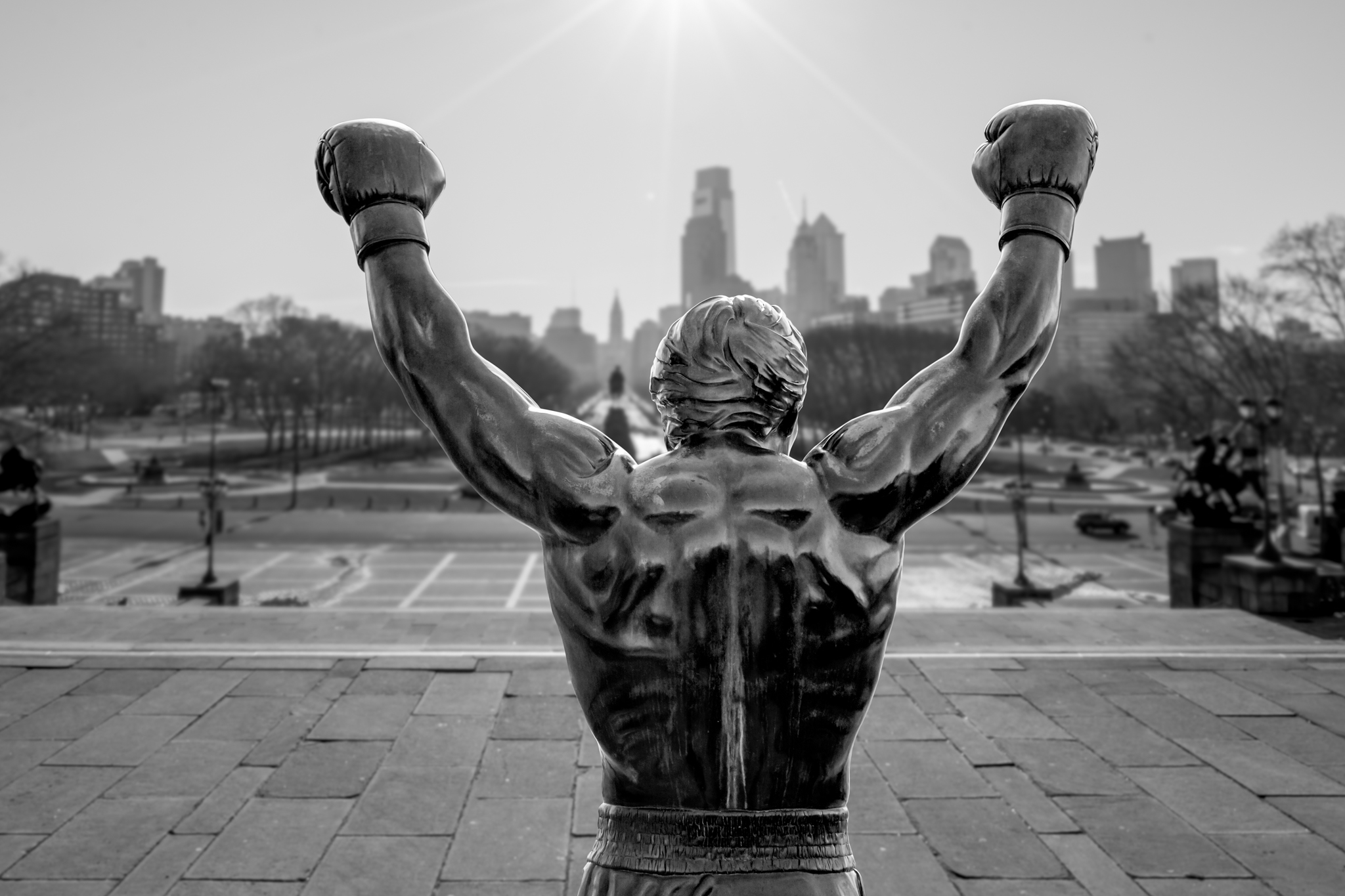
Who knew that a little film released in 1976, starring and written by an unknown actor, would go on to be the top-grossing movie of the year, earn Oscar gold and spawn sequels well into the 21st century? It's doubtful that even Sylvester Stallone's supposedly psychic mom Jackie could have predicted Rocky's enduring cultural impact. If you've seen any of the earlier movies you can probably hear the theme song in your head as you read this. Go on -- admit it. There are now eight -- count 'em, eight -- Rocky movies. And the latest, Creed II, is currently in theaters and is a certified smash. With that in mind, it seemed like a good time to take a look at the series as a whole and rank each movie from worst to first. Enjoy.
8. Rocky V

After 14 years of box office dominance, Rocky V was the movie that seemingly finally killed the series. As it turns out this intended final chapter of the boxing saga would merely be the first to feature the title character as mentor to a younger athlete. Co-starring real boxer/non-actor Tommy Morrison and including a Don King rip-off, Rocky V is chock full of bad ideas. Even writer and star Sylvester Stallone admitted to being disappointed in the film.
7. Rocky II
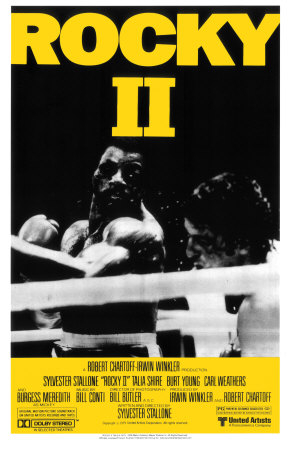
The first sequel of the franchise continues right where the original film ends -- moments after heavyweight champion Apollo Creed's successful defense of his title against South Philly southpaw Rocky Balboa. However, it quickly becomes clear that the bout took a monumental toll on the fighters as both are transported to a nearby hospital for treatment. Most of the movie finds the retired Balboa attempting to adjust to his newfound fame and fortune while the undefeated Creed grapples with the frustration stemming from having been knocked down for the first time in his career. Unsatisfied with a close win, Apollo challenges Balboa to a rematch. Struggling to support his new family with a rapidly dwindling bank account, Rocky agrees and the rivals face off yet again.
6. Rocky IV

A restless Apollo Creed comes out of retirement to face steroid-pumping Russian fighter Ivan Drago. After insisting that neither Rocky Balboa nor his trainer, Tony "Duke" Evers, stop the fight "no matter what", Creed is killed in the ring -- which is the only death that he'd envisioned for himself. Wanting to avenge his friend, Rocky agrees to fight Drago himself on Christmas Day in the Soviet Union.
5. Rocky
Rocky isn't the first Rocky movie that I saw. As a kid, the first one I heard about was Rocky III. I later saw it on cable. Next, I inferred from all of the "Apollo and Rocky" talk to which I was privy, that Rocky II might be worth my time. Again, I watched it on cable -- but only the actual fight at the end. That rematch was the nucleus of the fictional-boxing repartee I was exposed to anyway (I didn't see the entire movie until years later -- on Netflix). At that point, what I had seen so far kind of congealed in my mind into my perspective of the Rockyverse and I thought it was pretty great. A little while later, I saw Rocky IV from beginning to end and mentally added it to the set. It would be some time before I watched the movie that started it all -- and then only out of curiousity. I wondered how it all began. But honestly, the knowledge that it was produced in the 1970s lowered my expectations quite a bit. And I was pleasantly surprised. It wasn't an action movie, nor was it a slugfest. But it wasn't bad. I only thought of the Rocky sequels as 1980s blockbusters in the same vein as the Indiana Jones movies, the Rambo movies and E.T. So, imagine my surprise when I discovered that the original Rocky was the top-grossing movie of 1976. It outsold smash hits like The Enforcer, A Star Is Born, Silver Streak and King Kong; and enormously successful classics such as The Omen and All the President's Men.
People have a tendency to forget that Rocky was a criminal. In the beginning, boxing was a hobby but his day job was breaking legs for local loan shark Tony Gazzo (though he felt really bad about it and let at least one guy go with all of his bones intact).
Rocky's training regimen, including running up the steps of the Philadelphia Museum of Art and punching hanging beef carcasses, was appropriated from real-life Philly pugilism legend and former heavyweight titleholder Joseph "Smokin' Joe" Frazier. Frazier's nemesis, Muhammad Ali, is the obvious inspiration for Apollo Creed.
Contrary to popular misassumption, Carl Weathers, who portrays Creed, was never a boxer. He did, however, play professional football for the Oakland Raiders under Hall of Fame coach and video game icon John Madden in 1970 and 1971.
Rocky is a fairytale for white guys -- especially the Italian-American variety: A caucasian dude from humble beginnings challenges the African-American dominance of professional sports. The hero even gets a pure, virginal princess. Writer and star Sylvester Stallone based the story on an actual 1975 title fight between Chuck "The Bayonne Bleeder" Wepner and the first and only three-time world heavyweight champion, Muhammad Ali. In the movie, Rocky loses a split decision to undefeated champ Apollo Creed. However, Wepner was counted out in the 15th round without ever having knocked Ali down.
4. Rocky III
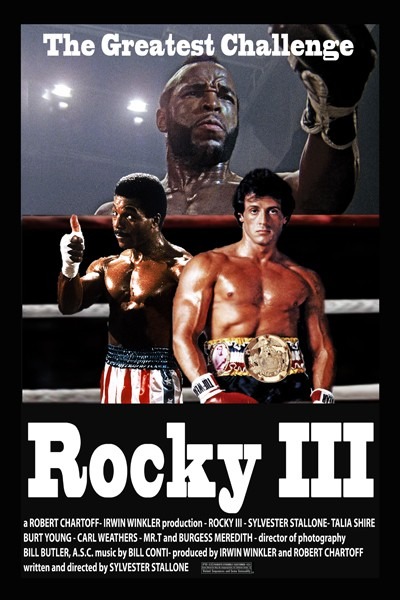
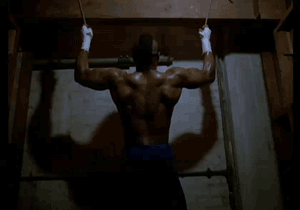
Rocky III was also a departure for the series in that it features a jacked, super-cut, streamlined Rocky as opposed to the unchiseled slab from the first two movies. And this time around Rock is no longer the underdog, but the high-profile champion. The Philly southpaw also trains outside of the City of Brotherly Love for the first time (in the following movie, Rocky IV, he trains in Krasnoyarsk, Siberia) when his one-time rival, former undisputed World Heavyweight Champion Apollo Creed, takes him to his native Los Angeles in order to coach him personally. They also take Paulie along, who's as racist as ever.
People tend to forget that Hulk Hogan appeared in the movie (his best) and in the ring. His Thunderlips, who towers over the Italian Stallion, tosses Rocky around as though he were a little kid in what is intended to be a mere exhibition match between the two. And like his fight with Apollo in Rocky, Rocky's sparring event against Thunderlips was inspired by a chapter in Muhammad Ali's life. In 1976, then-heavyweight boxing champion Ali faced professional wrestler Gorilla Monsoon in the ring during a World Wrestling Federation show held in Philadelphia Arena. The much larger Monsoon even picked Ali up and spun him around on his shoulders before throwing him onto the mat. A dazed Ali was quickly convinced by his corner to make an exit.
But despite the title, this is Mr. T's movie. He steals every scene in which he appears, Darth Maul-style. His James "Clubber" Lang is a mean, ambitious, Chicago-bred southpaw who teaches Mr. Balboa what happens to boxers who allow their edges to soften -- the hard way. Before beating the champ mercilessly, Lang insults Mickey, the now-retired Apollo and Rocky. On top of all of that, he hits on Adrian right in front of him at the unveiling of the Rocky statue at the top of the steps of the Philadelphia Museum of Art. Wow.
Rocky III features the hit song "Eye of the Tiger", which won for "Best Rock Performance by a Duo or Group with Vocal" at the 25th Annual Grammy Awards and was nominated for Best Original Song at the 55th Annual Academy Awards. The song also topped the Billboard chart for six weeks in a row, and as of 2015, has sold over 9 million copies worldwide. Ironically, "Eye of the Tiger" was only created out of necessity when Queen refused to give writer/director/star Sylvester Stallone permission to use "Another One Bites the Dust" as the movie's theme song.
3. Rocky Balboa
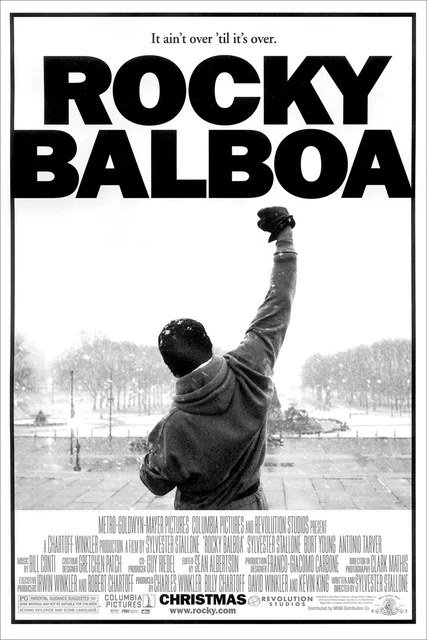
While the man himself does not pursue a comeback in Rocky Balboa, the film most certainly accomplishes that task for the franchise and it's star, Sylvester Stallone. The previous installment, Rocky V, is the series' absolute lowest point, in terms of both profit and artistic integrity. Ironically enough, it was the most expensive to produce. Go figure. I would advise anyone who hasn't seen it to spend the 104 minutes that it would take to watch the movie in its entirety doing something more worthwhile -- such as washing the car in the rain. Because it was so bad, many people decided to skip Balboa upon its initial release, which is a tragedy because its incredible.
Balboa is a return to form in several respects. Stallone, who'd ceded the director's chair for the preceding movie, resumes his duties behind the lens. Rocky reconnects with "Little" Marie, the loudmouth girl he walked home in the first movie. His opponent is portrayed as a thoughtful person and not just a one-dimensional villain. And most importantly, the series reverts to its dramatic roots (the three previous movies are much more action-oriented).
Rocky's relationship with his only son, Robert, Jr., which grew strained in the preceding movie, has only gotten worse over time. Though the elder Balboa's fortunes have risen (he is now a successful restaurateur), he continues to live in the city. Robert, now a grown man, has remained in Philadelphia as well but only maintains minimal contact with his father. Robert, Sr. only sees him when he shows up unexpectedly. Rocky does manage to bond with "Little" Marie's half-Jamaican teenaged son, "Steps" (short for Stephenson). Rocky, who's never been a candidate for Mensa, thinks Jamaica is in Europe.
The crux of the story revolves around Rocky's decision to suspend his retirement and put the gloves back on for a few charity bouts. After the state boxing commission reluctantly reinstates Balboa's license, the current champion's (Mason "The Line" Dixon -- that moronic name is the film's biggest flaw), promoters decide that their client's reputation needs the boost of credibility that would likely result from an exhibition match against the legend. The idea for the bout is actually inspired by a computer-simulated fight between the two produced by ESPN. The software calculates that Balboa would win by a knockout had he been given the opportunity to square off against the undefeated Dixon in each man's prime. Rocky wisely recruits Apollo's old trainer, Tony "Duke" Evers, who determines that because of his physical limitations due to his age (including reduced speed), the former champ must alter his technique and rely on brute strength to have any hope of competing.
Yes, Rocky's old. So is Sylvester Stallone. But in this film it works. Rocky's age is addressed by everyone. And I do mean everyone: the Pennsylvania boxing commission; his trainer, Duke; his son, Robert; his friend and brother-in-law, Paulie; his opponent, Dixon; neighborhood bullies; and Rocky himself.
As per the usual for these films, the simulated bout between Dixon and Balboa is based on real events. On January 20, 1970, 1500 theaters throughout the U.S., Canada and Europe screened a filmed enactment of a fictional boxing match between Muhammad Ali and Rocky Marciano called The Super Fight. At the time the two were the only undefeated heavyweight champions in boxing history and they agreed to act out a fight between them based on the predictions of an algorithm intended to calculate which would win had the two ever met in the ring in peak condition.
Although it debuted 30 years after 1976's Rocky, Rocky Balboa is the first realistic film of the set and was intended to cap the series off for good. Fittingly, the film is partly about closure. While Rocky might've lost a step or two, Stallone's skill in front of and behind the camera has only gotten better. He should really give some thought to continuing his filmmaking career, though he should probably hand the starring roles to someone else if he decides to make more action movies.
2. Creed II
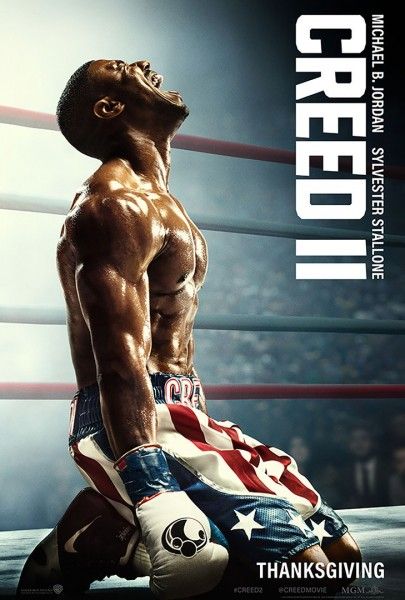
It's a shame that Creed and Creed II couldn't be released as one four-hour movie because the sequel is a perfect continuation of its predecessor. It also brings the events of Rocky IV full-circle but without the corny elements of that film. In particular, the towel is thrown into the ring in order to save a Drago from being killed by a Creed, where 33 years ago a Creed was killed by a Drago because the towel wasn't thrown into the ring.
The film also subtly addresses the series' inadequacies when it comes to naming African American characters (particularly Mason Dixon and Union Cane). And while it has its share of small introspective moments, Creed II has a large scope, featuring the most locales of any movie in the franchise. Adonis Creed traverses the globe like a 214-lb James Bond, traveling to Las Vegas, Mexico, Moscow, Los Angeles and, of course, Philly.
Like Creed and Rocky Balboa, Creed II is very much about fathers and sons -- but to an even greater extent. Now that the loose ends concerning the Dragos have been tied; the Balboas' issues have been resolved; and the Creeds seem to have found both redemption and peace, one question remains: Will Apollo's other two kids ever be addressed?
Fatherhood does loom large here but the second-most pervasive theme is redemption. Note that while Adonis lost twice in Creed, he emerges victorious from all three of his fights in the sequel. At times, the two themes work together: two fathers, Rocky and Ivan Balboa, redeem themselves as parents by mending their respective relationships with their sons.
1. Creed


Creed passes the Ran test with flying colors: there are no African-American sidekicks; no black criminals; no black "clowns" mugging for the camera; the black people aren't all uneducated; and the black guy isn't the first, or only, one to get killed (Actually, nobody dies in this movie. The black guy, who was the only one to get killed in a previous Rocky movie -- Rocky IV -- is mentioned quite often, however). And yet, the film -- a big-budget, mainstream Hollywood film -- is filled with African-Americans.
Rocky, Rocky II, Rocky V and Rocky Balboa all showcase the blue-collar and poor side of Philly -- but mostly Italian Philly. Creed features, even parades, African-American Philadelphia for the first time. But Creed's most significant departure from the rest of the series is something that shouldn't be such a big shift after all. The city is 44.1% African-American and the only black guys we've seen in the franchise up to this point are out-of-towners: Apollo Creed, his family and his team; Clubber Lang; Mason Dixon and his entourage; George Washington Duke; and Union Cane. For fuck's sake.
The black guy mentioned earlier, who was killed in Rocky IV, is former undefeated world heavyweight champion boxer Apollo Creed. And he practically haunts this film. It's even named after him. But its his son Adonis' story and how he copes with having a legendary father. The previous film, Rocky Balboa, touched on Rocky's son Robert's struggle to live in his famous father's shadow as well and its revealed in this movie that he surrendered to the pressure and moved, not only out of Philly, but out of the country. Rocky tells Adonis that Robert, Jr. now lives in Canada. Adonis however, takes the challenge head-on. He not only takes up his father's profession, he moves from Los Angeles to Philadelphia in order to solicit the Italian Stallion's training expertise.
And in turn, when Rocky needs someone to lean on, it is Adonis, and not his only son, who supports him.
For the first time, Sylvester Stallone plays a supporting role in a Rocky movie -- and he was richly rewarded for it. He was nominated for a Best Supporting Actor Oscar and won a Golden Globe for the same category. Creed's release date, November 25, 2015, is marks the fortieth anniversary of the date of the first scene in the original Rocky. How's that for coming full circle?
Originally Posted 11/1/18
Related:


No comments:
Post a Comment